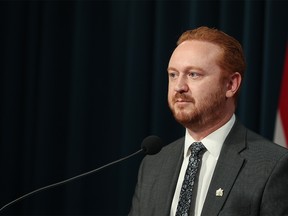Alberta announced similar but more sweeping policy changes in February

Article content
Alberta is planning to join the Saskatchewan government’s appeal to stop a constitutionality challenge of its pronoun consent law.
Attorney General Mickey Amery and the Alberta government are seeking leave to intervene in Saskatchewan’s legal bid to quash the challenge, his office confirmed on Tuesday.
Article content
“Saskatchewan and Alberta agree that the key figures in children’s lives are their parents, and our provinces are both committed to supporting families and children so that they can work through unique needs together,” reads a joint statement from Amery and Saskatchewan Attorney General Bronwyn Eyre.
Advertisement 2
Article content
“Notifying parents and requiring their consent before a child’s name or pronouns can be changed in schools, and before classroom discussions about gender identity and other sensitive subjects occur, ensures that the parent-child relationship is respected and paramount.”
Saskatchewan announced its pronoun policy — which requires parental consent for students under 16 to change their pronouns or their names to affirm their gender identity at school — in mid-2023. By the end of last year, it was enshrined into law, with the province using the notwithstanding clause to override sections of the Charter of Rights and Freedoms.
UR Pride Centre for Sexual and Gender Diversity — a non-profit based at the University of Regina — filed legal action against Saskatchewan’s policy shortly after it was announced. Two weeks ago, the Saskatchewan government filed leave for appeal and a stay of proceedings following a decision from the Saskatchewan Court of King’s Bench to allow the litigation to continue.
Recommended from Editorial
-

Half of all teachers experienced aggression from students in schools last year: ATA survey
-

Advocates fear loss of schools as safe space amid gender pronouns policy
-

Court challenge expected after Alberta details changes to transgender care
-

Advocates say UCP policy on gender pronouns is an attack on education
Article content
Advertisement 3
Article content
Amery and Eyre say Alberta will argue that Saskatchewan’s use of the notwithstanding clause “should have prevented Saskatchewan’s Court of King’s Bench from reviewing the constitutionality” of the legislation.
“This case has the potential to impact not only parental rights across Canada but also the application of the Parliamentary Supremacy Clause, which has been an integral piece of the Canadian Charter of Rights and Freedoms and the Constitution of Canada since 1982,” they said.
‘The lives and dignity of young people are at stake’: advocate
Alberta announced similar but more sweeping policy changes in February, which propose further restrictions around gender-affirming surgeries and participation in sports for transgender people. Legislation to enact those changes is expected this fall, and a legal challenge like the one in Saskatchewan is likely.
Bennett Jensen, co-legal counsel for UR Pride and director of legal at Egale Canada, said “all young people deserve to be celebrated and included for who they are.”
“We are now at a new low in our country where certain provincial leaders are joining forces to play a dangerous political game with the lives of gender-diverse youth,” Jensen said. “These governments are pursuing policies that rely on misinformation, violate the guidance of experts, and cause irreparable harm to young people.”
Advertisement 4
Article content
He said Egale would review and respond to Alberta’s motion to intervene once they receive it.
“We remind both governments that the policy measures legislated by the Government of Saskatchewan were found to cause irreparable harm to gender-diverse youth by the Saskatchewan Court of King’s Bench,” Jensen said. “The lives and dignity of young people are at stake. We urge these governments to prioritize the best interests of children and youth rather than their own political aims.”

Court battle could inform Alberta legislation: political scientist
Mount Royal University political scientist Lori Williams said it’s “not surprising” that the Alberta government is looking to aid in Saskatchewan’s appeal. It may act as an early test of Alberta’s proposed policy, which goes “a lot farther” than Saskatchewan’s.
“It’s a relatively efficient way of testing the constitutionality or the viability of the policy that’s been proposed (in Alberta). It’s possible that based on the decision that is issued by the Court of Appeal, that could inform the details of the legislation that’s proposed in Alberta,” she said.
Advertisement 5
Article content
“If the premier does go ahead with the much more restrictive laws being proposed in Alberta, that could be subject to a separate and very different challenge simply because it covers more restrictions than are involved in the Saskatchewan law.”
Williams said if granted leave as an “intervener” — as the Canadian Civil Liberties Association and four other groups have — it would allow Amery to make submissions on the case outlining Alberta’s perspective.
The federal government does not intend to intervene, but Williams said officials in Ottawa — and many Canadians — will be watching closely as the issue plays out in court.
“This, of course, is increasingly an issue that is being discussed and considered and becoming a point of real distinction between some governments, some politicians and others,” she said.
Article content







